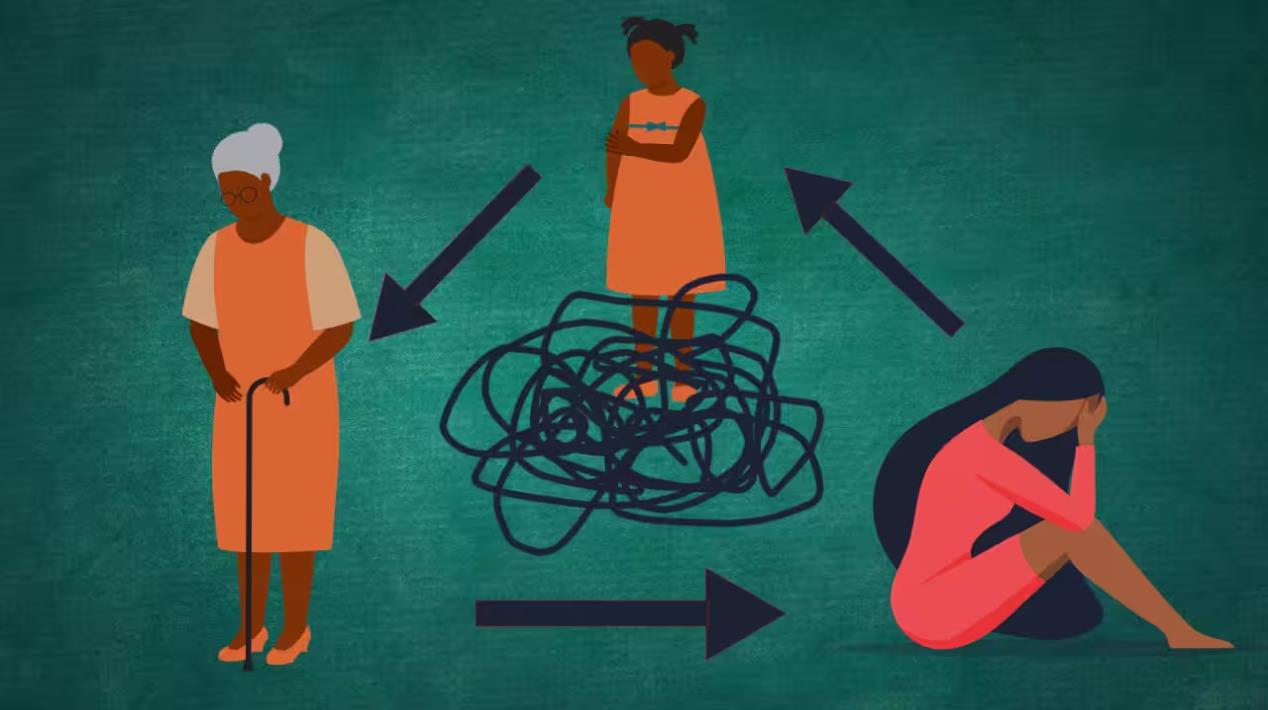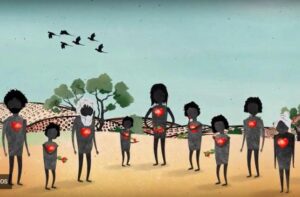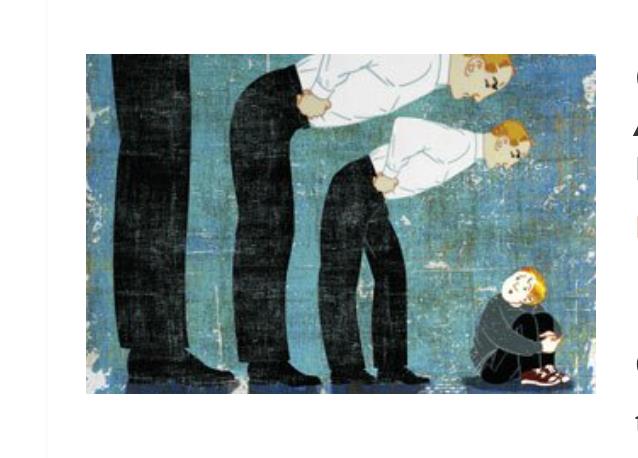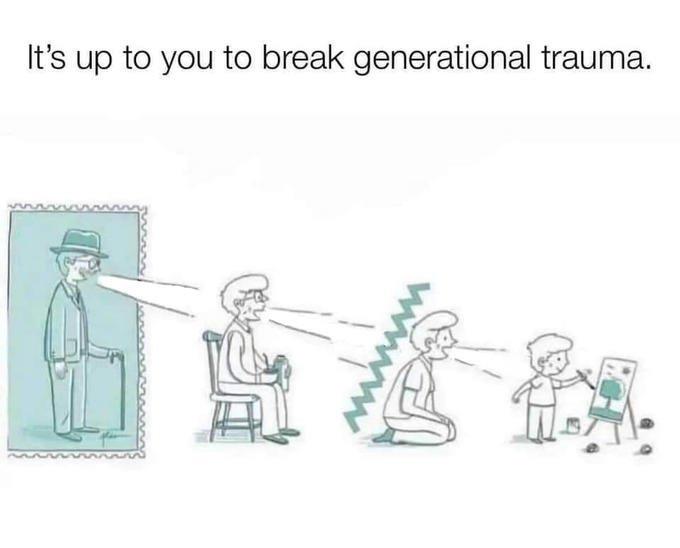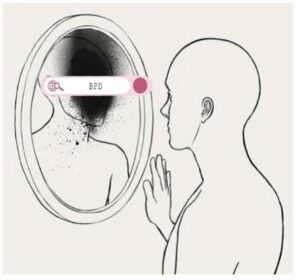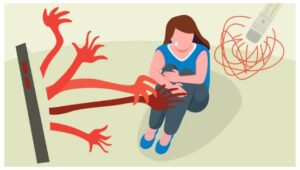These are wounds that aren’t your own. Sometimes the grief you feel doesn’t have a clear origin. You grow up with fears you can’t explain. Reactions that feel disproportionate. A heaviness that doesn’t seem to belong to your life but clings to it all the same.
Intergenerational trauma is the emotional, psychological, and biological imprint of pain passed silently through families. You don’t just inherit eye color or body type. You inherit memory. Belief. Silence. Shame. But you can also become the one who breaks the cycle.
Signs You Might Be Living with Intergenerational Trauma:
Not all trauma begins with you. You might be carrying echoes of pain from generations past without realizing it. Here are a few signs:
- Persistent guilt, shame, or fear with no clear reason
- Feeling like your emotions are “too much” for the situation
- A sense of living someone else’s story
- Recurring family patterns like addiction, secrecy, or emotional absence
- Always feeling responsible for others’ wellbeing
- Struggling to feel safe with joy or success
Your body remembers what your mind was never told.
Why “That Was Their Story, Not Yours” Doesn’t Always Hold True
Maybe you’ve been told these things:
“That happened to them, not you.”
“You have nothing to be upset about.”
But trauma isn’t always about what you witnessed. It’s about the emotional world shaped by those who did. Unspoken pain becomes the emotional air children grow up breathing. If no one names the grief, it gets carried in silence. If no one heals it, it keeps repeating.
The Inner Dialogues of Inherited Trauma
Intergenerational trauma tends to show up in quiet and unexpected ways, like:
“I don’t know why I feel this way.”
“There’s a sadness inside me that only keeps extending.”
“If I don’t keep everything tight, I’m sure it will fall apart before I realise.”
“My pain feels bigger than just mine.”
“I’m scared to be different from my family, even if it would bring me peace.”
These feelings aren’t a failure of strength, they’re signs of emotional inheritance.
What Healing Intergenerational Trauma Might Look Like:
Healing this kind of trauma is not about blame. It’s about the truth. And choice.
- Naming What Was Silenced
Many families operate with unspoken rules: “don’t talk, don’t feel.” Healing often begins by gently acknowledging what was never allowed to surface: grief, fear, betrayal, abandonment. You don’t name it to accuse, you name it to stop the silence from owning you.
- Becoming the Witness Your Ancestors Never Had
Sometimes healing means feeling what others weren’t allowed to. To cry the tears they swallowed. To hold the pain they weren’t safe to name. You aren’t dishonoring them by healing, you’re giving their pain the dignity it never received.
- Choosing Different
Every boundary you set, every pattern you end, every loving truth you speak, it shifts the story for future generations. You don’t have to pass down what you never asked to carry. Therefore, a trauma therapist will let you view the whole story under a better lens.
A Mini Real-Life Example: Ayesha’s Story
Ayesha always felt a deep sadness she couldn’t explain. Her grandmother had fled war. Her mother never spoke of it. But silence has a way of seeping into the next generation.
In therapy, Ayesha began to notice patterns: disconnection, fear, grief that didn’t belong to her life but lived inside her body. She didn’t need every detail of the past to begin healing. She just needed permission to feel what was never felt. Now, she carries the story with compassion, not confusion. Trauma therapists will work with you on these unexplainable emotions and what they imply to you by exploring further.
Why This Work Is Not Just Personal, But Sacred:
When you heal, you don’t just shift your own path. You change what gets passed forward. At Coach For Mind, our trauma therapists in India understand how deep this work goes. You deserve support that honors your full story, even the parts you inherited.
Whether you’re navigating generational grief, trauma responses you can’t explain, or patterns that keep repeating, you don’t have to do it alone.
FAQ: Healing Intergenerational Trauma
What is intergenerational trauma?
It’s the transmission of emotional wounds, stress, and survival patterns from one generation to the next, often passed through silence, behavior, and nervous system responses.
How can trauma be passed down if no one told me anything?
Even without words, children absorb emotional cues. You might inherit anxiety, fear, or shame just through energy, tone, or emotional absence, not through explicit storytelling.
Is trauma actually biological?
Yes, epigenetic research shows trauma can affect how genes express, especially in stress-related systems. You can carry inherited sensitivities, even if your life seems “safe” now.
What are common signs of inherited trauma?
Unexplained grief, fear of joy, family patterns like addiction or emotional distance, or always feeling emotionally overwhelmed can be signs.
Do I need the full family history to heal?
Not at all. You can begin healing with what you feel now. Your body and emotions are already telling you what needs attention.
Will healing myself affect future generations?
Absolutely. When you heal, you change how you relate, love, and raise others. You stop passing down unconscious pain and create safety for future connection.
How does Coach For Mind support this kind of healing?
Our trauma therapy in India is designed to hold ancestral pain with care. We help you understand what’s yours, what was inherited, and how to build a new emotional legacy, from the inside out.
You didn’t start the fire. But you have the courage to stop its spread. By doing so, you become the promising ancestor your family has awaited for so long. If you’re looking for trauma therapy somewhere near you, or want to begin your journey with a trauma therapist in India, we’re here to support you.
Why CoachForMind?
- We don’t merely address symptoms. We examine what’s really happening beneath the surface—past pain, trauma, or recurring patterns. You’ll collaborate with trained psychologists. Everyone here possesses the required qualifications and experience. You’ll engage with someone who listens and comprehends profoundly.
- Therapy is designed specifically for you.We don’t adhere to a rigid plan. We tailor the process based on your needs and current situation.
- We utilize various forms of therapy: Psychodynamic, IFS (Internal Family Systems), Somatic (body-oriented work), CBT and DBT and Narrative Therapy.
- It’s an environment to develop at your own rhythm.
You don’t need to feel prepared. We’ll navigate this journey together.
For more information, please visit our website or contact us directly at coachformind@gmail.com

